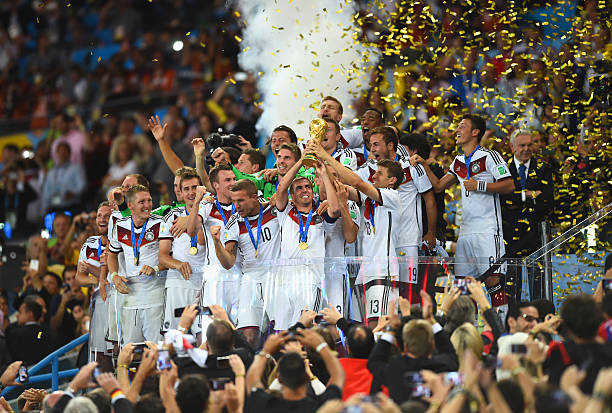When Germany lifted the FIFA World Cup on July 13, 2014, inside Rio de Janeiro’s legendary Maracanã Stadium, it marked the culmination of a meticulously planned football project that had been in the making for more than a decade. The 1–0 victory over Argentina, sealed by Mario Götze’s extra-time goal, was more than just another title : it was a statement about efficiency, resilience, and the revival of German football on the global stage.
This is the story of Germany’s road to the title, from the quiet assurance of their qualification campaign to the unforgettable nights in Brazil that defined an era.
A Swift March Through Qualification
Germany entered the European qualifying campaign for the 2014 World Cup as heavy favorites in group C. Their opponents : Sweden, Austria, the Republic of Ireland, the Faroe Islands, and Kazakhstan posed challenges, but none of them were expected to interrupt Joachim Löw’s well-oiled machine.
The Germans started strongly, beating the Faroe Islands 3–0 and Austria 2–1 in September 2012. Over the course of the campaign, they scored freely, with Mesut Özil, Thomas Müller, and Miroslav Klose finding the net consistently.
The only shadow point came in a thrilling 4–4 draw against Sweden in Berlin. Germany led 4–0 after 60 minutes but collapsed defensively in one of the most shocking turnarounds in their history. That match also underlined a crucial lesson : the need for defensive concentration, something Joachim Löw wanted to change before going to Brazil.
By October 2013, Germany had secured qualification with ease, finishing first with nine wins, one draw, and a staggering 36 goals scored. The message was clear : Germany was coming to Brazil not just to compete, but to win.
The Selected Players by Joachim Low :
Goalkeepers : Manuel Neuer, Ron-Robert Zieler, Roman Weidenfeller.
Defenders : Kevin Grobkreutz, Matthias Ginter, Benedikt Howedes, Mats Hummels, Erik Durm, Philipp Lahm, Per Mertesacker, Jerome Boateng, Shkodran Mustafi.
Midfielders : Sami Khedira, Bastian Schweinsteiger, Mesut Ozil, Andre Schurrle, Lukas Podolski, Thomas Muller, Julian Draxler, Toni Kroos, Mario Gotze, Christoph Kramer.
Attackers : Miroslav Klose.
The Group Stage: Testing Composure and Depth
Germany 4–0 Portugal (June 16, Salvador)
Thomas Muller 12′ (penalty), 45+1′, 78′, Mats Hummels 32′
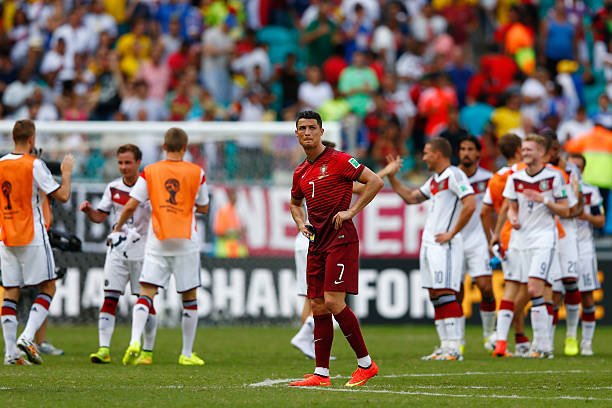
Germany’s World Cup campaign began in the sweltering Salvador heat against a Portugal side led by Cristiano Ronaldo. Löw’s team, however, dismantled their opponents with ruthless efficiency.
Thomas Müller opened the scoring from the penalty spot after Mario Götze was fouled. Mats Hummels added a towering header to make it 2–0 before Portugal’s Pepe was sent off for a reckless headbutt on Müller. With numerical advantage, Germany pressed further. Müller struck twice more, completing his hat trick and reminding the world that he thrived on the biggest stages.
It was a statement performance: Germany was here to dominate.
Germany 2–2 Ghana (June 21, Fortaleza)
Mario Gotze 51′, Miroslav Klose 71′ for Germany. Andre Ayew 54′, Asamoah Gyan 63′ for Ghana.
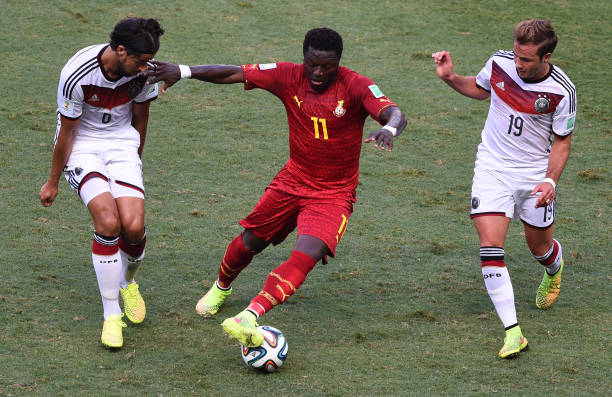
The second match tested Germany’s resilience. Facing Ghana’s athletic and determined side, Germany took the lead through Götze, only to concede twice in quick succession. Suddenly, the Africans were on the verge of an upset.
Enter Miroslav Klose. The veteran striker, on as a substitute, poked in from close range to equalize. It was not just an important goal for the match—it tied Klose with Ronaldo of Brazil as the all-time leading scorer in World Cup history (15 goals). The match ended in a 2–2 draw, leaving Germany momentarily vulnerable in the group.
Germany 1–0 United States (June 26, Recife)
Thomas Muller 55′
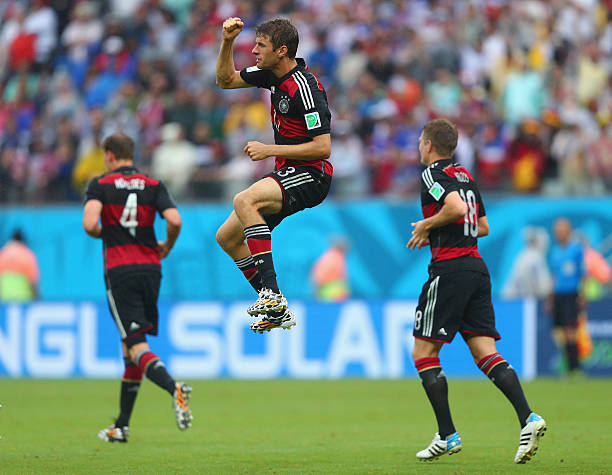
In Recife’s torrential rain, Germany faced the United States, coached by none other than Jürgen Klinsmann, Löw’s former boss. The narrative was rich with history, but on the pitch, it was pragmatic.
Müller again proved decisive, firing a precision shot from the edge of the area to secure a 1–0 win. The victory guaranteed Germany’s passage to the Round of 16 as group winners, with Portugal eliminated on goal difference.
Knockout Rounds: Steely Resolve
Round of 16 : Germany 2–1 Algeria (a.e.t.) – June 30, Porto Alegre
Andre Schurrle 92′, Mesut Ozil 119′ for Germany. Abdelmoumene Djabou 120’+1 for Algeria.
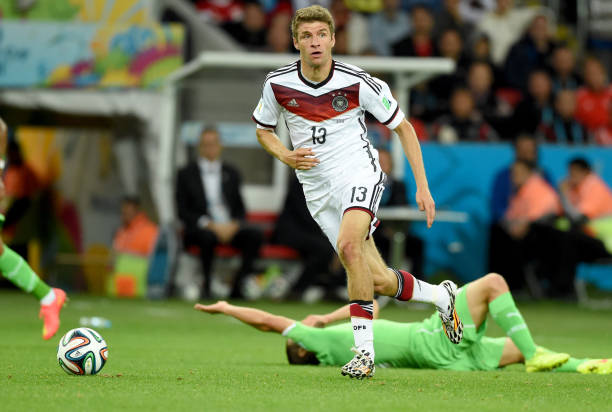
Perhaps the most complicated match of the tournament for Germany came against Algeria. The North Africans pressed high, exploited Germany’s high defensive line, and forced goalkeeper Manuel Neuer into sweeper-keeper heroics. Neuer rushed out of his area repeatedly, often intercepting balls more like a center-back than a goalkeeper.
Algeria held Germany 0–0 through 90 minutes, causing serious anxiety. But in extra time, André Schürrle broke the deadlock with a clever flicked finish, and Mesut Özil added a second. Algeria pulled one back late, but Germany survived.
It was a narrow escape, but also proof of their resilience under pressure.
Quarterfinal: Germany 1–0 France (July 4, Rio de Janeiro)
Mats Hummels 12′
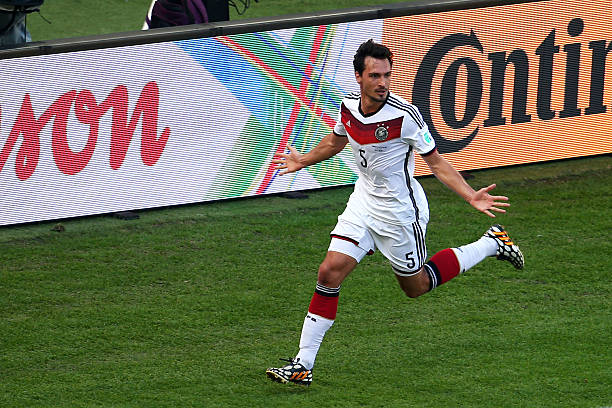
The stage shifted to the Maracanã for a clash of European giants. France, back after years of turmoil, posed a real threat. Yet Germany, calm and efficient, controlled proceedings.
Early in the match, Mats Hummels took advantage on Raphaël Varane with a header after a Toni Kroos free kick. From there, Germany’s defense held firm. Neuer made key saves, and Philipp Lahm, restored to right-back, neutralized France’s wide threat.
The 1–0 victory was mature and professional, setting up a semifinal date that would become legendary.
The Historic Semifinal: Germany 7–1 Brazil (July 8, Belo Horizonte)
Thomas Muller 11′, Miroslav Klose 23′, Toni Kroos 24′ and 26′, Sami Khedira 29′, Andre Schurrle 69′ and 79′ for Germany. Oscar 90′ for Brazil.
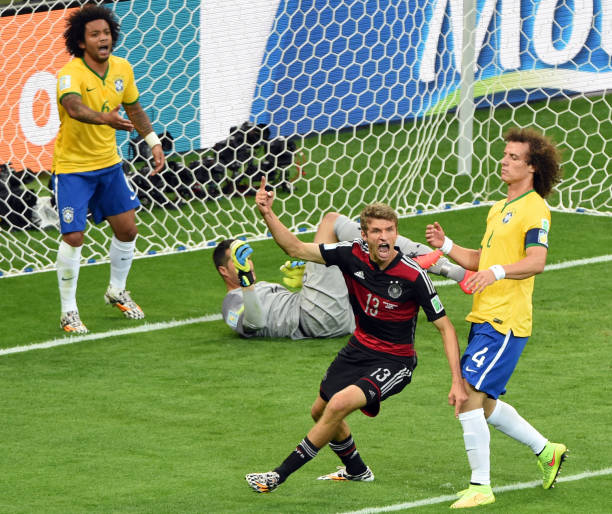
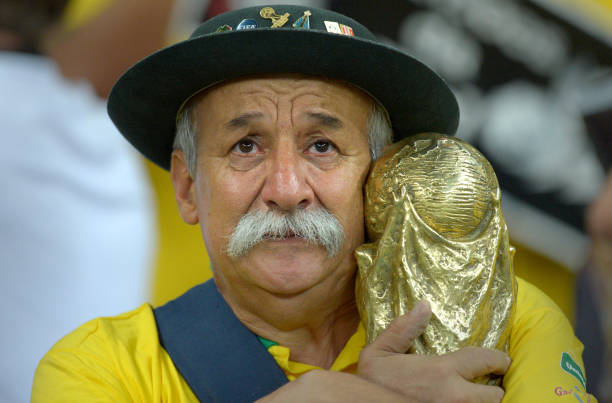
No match in World Cup history compares to the shock of Germany’s semifinal demolition of Brazil. With Neymar injured and captain Thiago Silva suspended, Brazil carried the hopes of a nation into Belo Horizonte, only to collapse in catastrophic fashion.
Germany attacked first through Müller in the 11th minute. Then, in an astonishing six-minute span, Miroslav Klose scored (breaking Ronaldo’s record with his 16th World Cup goal), followed by two from Kroos and another from Sami Khedira. At 5–0 after just 29 minutes, the stadium was stunned into silence.
In the second half, Schürrle added two more, his second a thunderous strike off the bar. Brazil managed a consolation goal from Oscar, but the damage was irreversible.
The 7–1 remains one of the most shocking results in football history. For Germany, it was the ultimate demonstration of ruthlessness, precision, and tactical superiority.
The Final : Germany 1–0 Argentina (a.e.t.) – July 13, Rio de Janeiro
Mario Gotze 113′
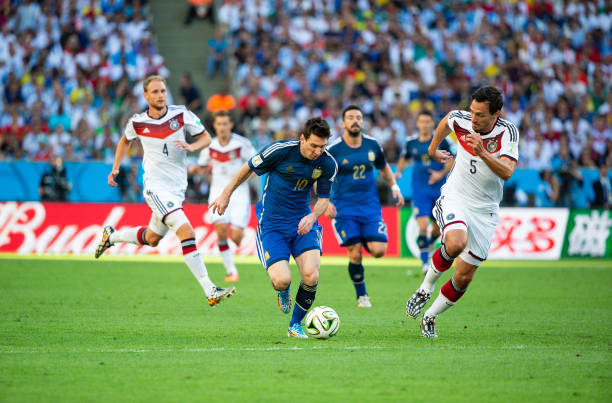
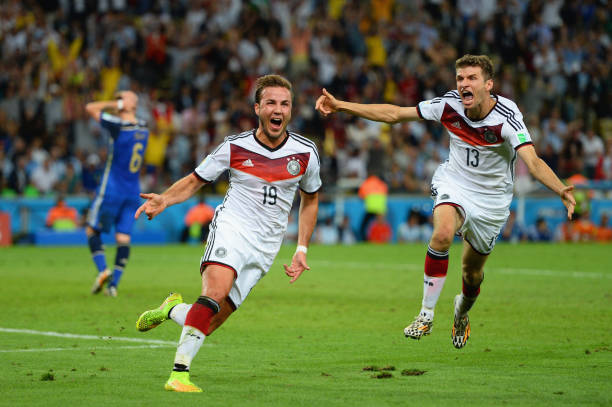
The final at the Maracanã brought Germany face-to-face with Argentina, led by Lionel Messi, desperate to crown his career with international glory.
The match was tight, tense, and combative. Argentina created chances, most notably Gonzalo Higuaín’s miss after a defensive error and Messi’s shot dragged wide. Germany, meanwhile, probed patiently, relying on their collective structure.
With the score 0–0, the game moved into extra time. Then came the defining moment. In the 113th minute, André Schürrle burst down the left and delivered a precise cross. Mario Götze, on as a substitute, controlled the ball on his chest and volleyed past Sergio Romero.
Götze’s goal instantly etched itself into history. Germany held firm until the final whistle, sealing their fourth World Cup title and becoming the first European team to win the tournament on South America’s land.
Key Figures in Germany’s Triumph :
- Joachim Löw: Criticized for tactical rigidity in the past, Löw struck the perfect balance in Brazil, blending experienced leaders with youthful energy.
- Manuel Neuer: His revolutionary sweeper-keeper role redefined modern goalkeeping. His performance against Algeria alone was legendary.
- Thomas Müller: With five goals, he again proved himself one of the world’s great tournament players.
- Mats Hummels & Philipp Lahm: Defensive rocks, providing leadership and composure.
- Miroslav Klose: Broke the all-time World Cup scoring record with 16 goals.
- Mario Götze: Delivered the most important goal in German football since 1990.
Legacy of 2014 :
Germany’s World Cup victory was more than a trophy. It validated a decade-long reform of German football following their disappointing reuslts in the 2000’s. Investment in youth academies, tactical innovation, and a focus on technical skill over brute force had paid off.
The triumph also marked the high point of a golden generation, with players like Lahm, Schweinsteiger, and Klose bowing out at the peak. It was a team defined by unity, precision, and intelligence, not just individual brilliance.
For Brazil, the 7–1 defeat left deep scars. For Argentina, Messi’s near-miss haunted his international career until the Copa América triumph in 2021. For Germany, however, July 2014 represented the fulfillment of destiny.
